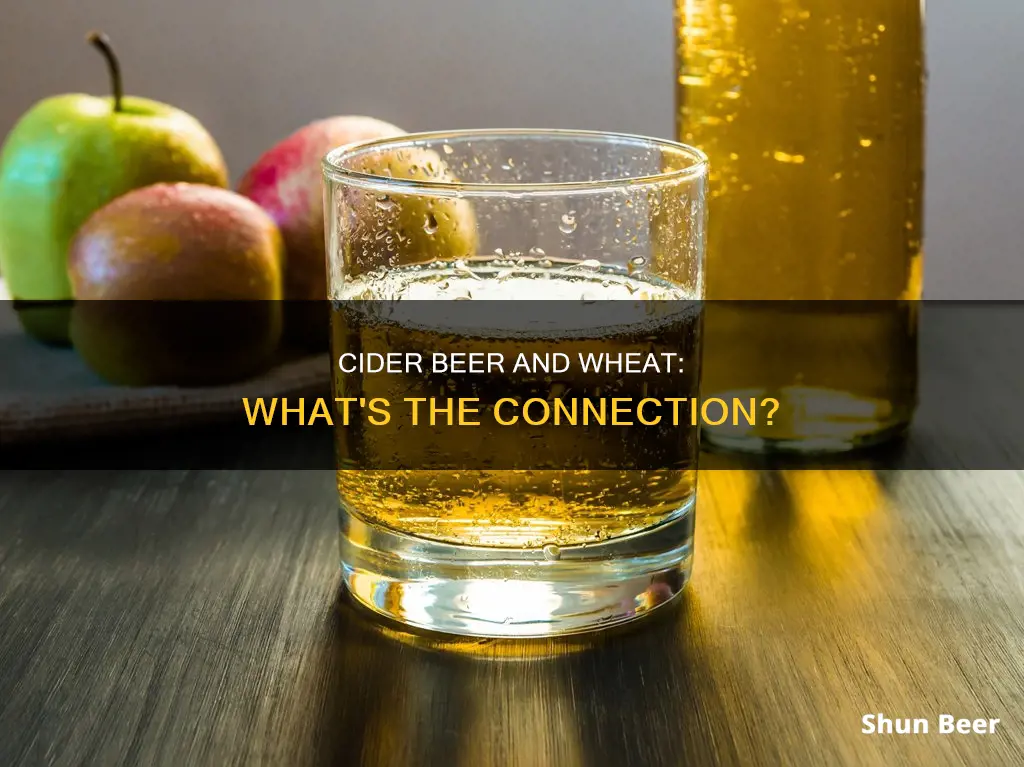
Cider is a gluten-free alcoholic beverage made from fermenting apple or other fruit juices with sugar and yeast. While yeast can sometimes contain gluten, the yeast used in cider fermentation is typically gluten-free. Therefore, cider is a good alternative to gluten-containing beers for those with gluten sensitivity or celiac disease. However, it is important to be cautious of other additives or flavorings that may contain gluten, and to check for a gluten-free label.
What You'll Learn
- Cider is made from fruit juice, typically apples, and is gluten-free
- Some ciders may contain trace amounts of gluten due to the yeast used
- Cider is a good alternative for those who can't drink beer due to gluten intolerance
- Beer is made from wheat or barley, and most varieties are not gluten-free
- Cider and beer have similar vitamin and mineral content but differ in sugar and carb levels

Cider is made from fruit juice, typically apples, and is gluten-free
Cider is a gluten-free alcoholic drink made from fruit juice, most typically apples. It is produced by fermenting apple or other fruit juices with sugar and yeast. While yeast can sometimes contain gluten when it is a byproduct of brewing beer, the yeast used in cider fermentation is usually gluten-free.
Cider is a good alternative to gluten-containing beers, which are made from wheat or barley. However, not all ciders are gluten-free. Some ciders, such as Hornsby's and Harpoon, contain trace amounts of gluten due to the gluten-based yeast used in the fermentation process. These ciders have been measured at less than 20 parts per million of gluten content, which meets the FDA's proposed threshold for gluten-free. Still, they are not entirely gluten-free and may not be suitable for people with high gluten sensitivity or celiac disease.
It is important to read labels carefully when choosing a cider, as some brands may use barley for enzymes and flavour. Additionally, cider may be processed in facilities or with equipment that is also used for brewing or bottling beer or other gluten-containing beverages. If a cider does not have a gluten-free label, further research is recommended before consumption by those with gluten sensitivities.
Cider offers a variety of complex flavours and is a refreshing drink option, especially during hot summer months. It has gained popularity, particularly in the United States, due to the increasing demand for gluten-free products. Cider also contains polyphenols, which are natural compounds that improve blood pressure and cholesterol, contributing to its health benefits.
Space Dust IPA: Wheat-Based Beer Mystery Solved
You may want to see also

Some ciders may contain trace amounts of gluten due to the yeast used
Cider, or "hard" cider, is typically made from apples or other fruits and is a good alternative to gluten-containing beers. It is produced by fermenting fruit juices, typically apple, with sugar and yeast. While most ciders are gluten-free, some may contain trace amounts of gluten due to the yeast used or other additives.
Yeast plays a crucial role in the fermentation process of cider, converting sugars into alcohol. In most cases, the yeast used in cider fermentation is naturally gluten-free. However, there are instances where gluten-based yeast, known as "Brewer's yeast," may be used. This type of yeast is a byproduct of brewing beer and can introduce trace amounts of gluten into the cider.
The use of gluten-based yeast in cider production is relatively uncommon, but it is important to be aware of for those with gluten sensitivities or celiac disease. Ciders that use gluten-based yeast typically have gluten content measured at less than 20 parts per million, which meets the FDA's proposed threshold for gluten-free products. However, these ciders are not entirely free of gluten and may pose a risk to individuals with more severe gluten intolerances.
It is worth noting that other factors can also contribute to the presence of gluten in cider. For example, cider may be processed in facilities or with equipment that is also used for brewing or bottling gluten-containing beverages, leading to potential cross-contamination. Additionally, some producers may add gluten-containing ingredients, such as wheat and barley, to enhance the flavour of the cider.
To ensure the cider is gluten-free, it is recommended to opt for certified gluten-free brands. These ciders are produced in dedicated gluten-free facilities, preventing cross-contamination and ensuring that no gluten-containing ingredients are added during the production process. By choosing certified gluten-free ciders, individuals with gluten sensitivities can enjoy their drink with peace of mind.
The Longevity of White Wheat Beers Explored
You may want to see also

Cider is a good alternative for those who can't drink beer due to gluten intolerance
Cider is a good option for those with gluten intolerance because it does not contain wheat or other gluten-containing grains that are typically found in beer. For example, beer is often made with barley, rye, and sometimes oats—all of which contain gluten. Therefore, most beers are undrinkable for people with gluten sensitivity or celiac disease.
However, it is important to note that not all ciders are completely gluten-free. Some ciders, such as Hornsby's and Harpoon, contain trace amounts of gluten due to the gluten-based yeast used in the fermentation process. These ciders have been measured at less than 20 parts per million of gluten, which meets the FDA's proposed threshold for gluten-free. Nonetheless, those with severe gluten sensitivity may still react to these low levels of gluten.
When choosing a cider, it is important to look for a gluten-free label or confirm with the manufacturer that the cider is gluten-free. It is also important to be aware of other additives or flavorings that may contain gluten. Additionally, cider may be processed in facilities or with equipment that is also used for brewing or bottling beer or other gluten-containing beverages, which could lead to cross-contamination. Therefore, it is advisable to choose a brand of cider from a dedicated cider-making company.
Some recommended gluten-free cider brands include ACE Cider, Angry Orchard, Blue Mountain Cider Company, Crispin Cider, Jack's Hard Cider, Magners Cider, Original Sin Hard Cider, Rekorderlig Cider, and Strongbow Cider. These ciders are considered safe for people with celiac disease and non-celiac gluten sensitivity.
German Wheat Beers: Sweet or Not?
You may want to see also

Beer is made from wheat or barley, and most varieties are not gluten-free
Cider, or "hard cider", is an alcoholic beverage made from fruits, typically apples. It is produced by fermenting apple or other fruit juices with sugar and yeast. While yeast can sometimes contain gluten when it is a byproduct of brewing beer, the yeast used in cider fermentation is typically gluten-free. Therefore, cider is a good alternative to gluten-containing beers.
However, it is important to be cautious of other additives or flavourings in cider that may contain gluten. Additionally, cider may be processed in facilities or with equipment that is also used for brewing or bottling beer or other gluten-containing beverages. Hence, it is recommended to look for a gluten-free label or conduct further research before consuming cider if you are gluten intolerant.
Now, let's talk about beer. Beer is an alcoholic beverage produced by brewing and fermenting starches from cereal grains. The most common cereal grain used in beer production is malted barley. However, other grains such as wheat, maize (corn), rice, and oats are also commonly used. The fermentation process involves converting the starch sugars in the wort into ethanol and carbon dioxide, resulting in the beverage we know as beer.
Beer is typically made from wheat or barley, and most varieties are not gluten-free. The gluten content in beer can be an issue for individuals with gluten sensitivity or celiac disease, a digestive condition triggered by the consumption of gluten found in foods containing wheat, barley, rye, and sometimes oats. Therefore, it is important for those with gluten intolerance to be cautious when consuming beer and to look for gluten-free alternatives, such as cider.
While most beer varieties contain gluten, it is worth noting that some brewers have created gluten-free options. These gluten-free beers are made with alternative grains like sorghum instead of wheat, barley, or rye, making them safe for consumption by those with gluten intolerance. However, such options are limited due to the prevalence of gluten-containing grains in traditional beer production.
Exploring the World of Wheat Beers: Are All Brews Wheat-Based?
You may want to see also

Cider and beer have similar vitamin and mineral content but differ in sugar and carb levels
Cider and beer differ in their composition, but they have similar vitamin and mineral content. Beer is made with yeast, hops, water, and cereals, while cider is made by fermenting fruit with sugar and yeast. Beer is typically made with wheat or barley, whereas cider is usually made with apples, which are gluten-free.
Cider is a good alternative for those who enjoy beer but are unable to drink it due to gluten intolerance. However, it's important to note that some ciders may contain trace amounts of gluten, usually due to the gluten-based yeast used in the fermentation process. These include brands like Hornsby's and Harpoon, which have been measured at less than 20 parts per million of gluten content.
While both beverages provide antioxidants, vitamins, and minerals, they differ in their sugar and carbohydrate levels. Beer is sugar-free, while cider can be quite high in sugar due to the natural sugar content of the fruit used. Commercial ciders also tend to add extra sugar to appeal to sweeter palettes, increasing the overall sugar and carbohydrate content. As a result, ciders are typically higher in calories than beer.
However, it's worth noting that dryer ciders, which allow the yeast to consume more of the cider's natural sugars, will have lower sugar levels and higher alcohol content. The type of cider, whether commercial or dryer, will impact its nutritional profile.
Bass Beer and Wheat: What's the Connection?
You may want to see also
Frequently asked questions
Cider is almost always gluten-free as it is made from fruit and does not contain wheat, barley, or rye. However, some ciders may contain trace amounts of gluten due to the gluten-based yeast used in the fermentation process.
Cider is made from the juice of specially grown varieties of apples, pears, and other fruits such as berries and pineapples.
Cider has some health benefits over beer, such as containing vitamin C and antioxidants from apples and apple skin. It is also gluten-free, which can be beneficial for those with gluten allergies or sensitivities. However, beer contains more vitamins and minerals, including magnesium, potassium, and B vitamins. Ultimately, both beverages have their pros and cons, and it's important to drink in moderation.
If you have celiac disease or a gluten sensitivity, it is best to choose a cider that is confirmed to be gluten-free. Some leading cider brands that are gluten-free include Woodchuck, Woodpecker, Crispin, Angry Orchard, ACE, and DownEast.
If you're looking for gluten-free alternatives to cider, you can try gluten-free beer or hard cider, which is made from fruits like apples, pears, or berries.







